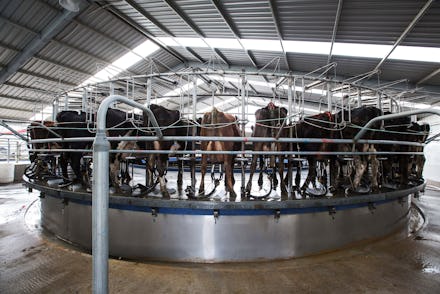While shoppers scramble for groceries, farmers are literally pouring milk down the drain

Consumers are scrambling to stock up on pantry essentials in the midst of the coronavirus outbreak in the United States, yet farmers around the country are dumping milk down the drain because they can’t get it into stores. The situation lays bare a complex patchwork of problems: Farmers can’t get their goods to market, grocery stores are rationing products, and all the while food banks are asking for additional support.
In Wisconsin, dairy farmers say that schools were one of their main consumers of milk and cheese. Now that educational institutions are closed, over one-third of demand has dropped off. Restaurants and coffee shops that also once consumed billions of dollars' worth of dairy products have closed for regular business, and farmers have been told that the only real option for them is to dump their milk back into the fields or manure pits.
The Department of Natural Resources has called for dumping as a “last resort,” but it's one that seems like the only option to farmers now. There’s an environmental concern, too, as milk is considered a pollutant; dumping of millions of gallons of the stuff will have untold impacts on the environment.
In Arizona, a dairy farmer reported that 125,000 gallons of milk are being dumped every day because grocery stores have limited the number of shipments they’ll accept. “A million pounds of milk right now is being dumped because we don’t have a home for it,” said Bill Kerr, the chairman of Arizona Milk Producers, a non-profit working to support dairy farmers in the state.
Grocery stores managers are asking that shoppers buy a limited amount of dairy products so as to prevent “hoarding,” but farmers in the state actually want people to purchase more milk, not less. The Arizona Milk Producers organization has even gone so far as to say that shoppers who see a sign that limits milk purchases should send them a photo so that they can “rectify” the situation.
Meanwhile, customers' photos of bare shelves and refrigerators at their local stores have been shared every day of the coronavirus pandemic.
The pandemic compounds the already precarious state of dairy farmers in the U.S., who have struggled in recent years with lower demand and prices for dairy products. The CARES (Coronavirus Aid, Relief, and Economic Security) Act, passed last month by Congress to provide direct financial relief to Americans, included $23.5 billion for farmers. Now, in the face of unprecedented dumping of dairy products, farmers are demanding greater help for their businesses, in the form of subsidies and bankruptcy protection. Farmers are also asking that the U.S. Department of Agriculture step in to address the supply chain issues that underlie these distribution problems.
The spread of coronavirus has reshaped every aspect of public life and forced leaders to grapple with what work is deemed essential and which industries deserve federal assistance. At the heart of this is the national food supply chain. Why, in the richest country in the world, are some people going hungry while food is literally being dumped down the drain?